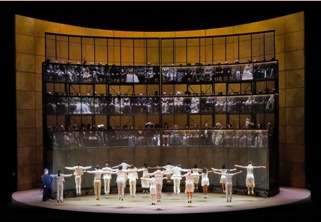|
Back
Back from the Dead New York
Metropolitan Opera
10/20/2019 - & October 24,* 29, November 1, 4, 7, 10, 2019
Christoph Willibald Gluck: Orfeo ed Euridice
Jamie Barton (Orfeo), Hera Hyesang Park (Amore), Hei-Kyung Hong (Euridice)
Dan Saunders (Harpsichord), The Metropolitan Opera Chorus, Donald Palumbo (Chorus Master), The Metropolitan Opera Orchestra, Mark Wigglesworth (conductor)
Mark Morris (production and choreography), Allen Moyer (sets), Isaac Mizrahi (costumes), James F. Ingalls (lights)

(© Ken Howard)
“Antique” opera has enjoyed a vogue for the past 20 or 30 years, but sometimes the results leave audiences wondering why someone would bother to revive whichever obscure seventeenth or eighteenth century opera they spent an evening yawning through on a leading stage. All too often the genre escapes interesting presentation and can be reduced to concert performances in all but name. A short work like Gluck’s, which in its original 1762 version clocks in at 85 minutes with no intermission, can raise questions about seriousness, even though it is thought to have “revolutionized” operatic convention. But with the creative impulses of director-choreographer Mark Morris, whose imaginative production premiered in 2007, the Met has revived an unexpected crowd pleaser that has been in and out of the repertoire since the company’s earliest season (it premiered at the Met in 1885 and had its 100th performance on the October 24 performance under review).
Mr. Morris’s concept truly makes this a successful production. For a work of paper-thin simplicity, he imaginatively cast much of the work with the chorus of underworld denizens styled as noted historical figures costumed by fashion designer Isaac Mizrahi. They include celebrated royals (Princess Diana, Queen Elizabeth I, Henry VIII, Queen Victoria, Louis XIV), noted African-Americans (Harriet Tubman, Frederick Douglas, Martin Luther King, Jr., Ella Fitzgerald), dictators (Stalin, Mussolini, Mao Zedong – no Hitler, though), celebrities (John Lennon, Jimi Hendrix, Will Rogers, Judy Garland), people of the ancient world (Salome, Livia, Cleopatra), and even Abraham Lincoln in his iconic top hat. Arrayed in rows above the stage, they take maximum advantage of the Met’s high proscenium to suggest the universality of the afterlife and eternality of the work’s moral message of self-restraint. Hades is suggested by caverns, through which Orfeo must lead, lose, and regain Euridice. Amor descends a long way down from above the stage, singing all the way, but adds the production’s only major eyesore with her contemporary casual pink outfit. The dance sequences are Mr. Morris’s standard airy passages and have more than a hint of jazzercise about them.
Met music director James Levine, who just settled a lawsuit against the Met after his summary dismissal amid sexual harassment allegations, championed the work with the argument that a steady dramatic hand can absorb the audience in any work. Mark Wigglesworth brought less gravitas to the score, but the reduced Met orchestra delivered it with elegance and precision, while the chorus lived up to its fine reputation as a superlatively well trained ensemble. Excellent principals added considerably. The title role went to the rising mezzo Jamie Barton, whose dramatic presence and adept singing riveted the whole house and reminded us that she is now the Fricka and Eboli of choice. Veteran soprano Hei-Kyung Hong accompanied her in the smaller role of Euridice. Her lustrous soprano and superb acting convinced the audience of real matrimonial love. Hera Hyesang Park accomplished the dexterous stunt entrance from above the proscenium arch artfully and sang with feeling.
Paul du Quenoy
|